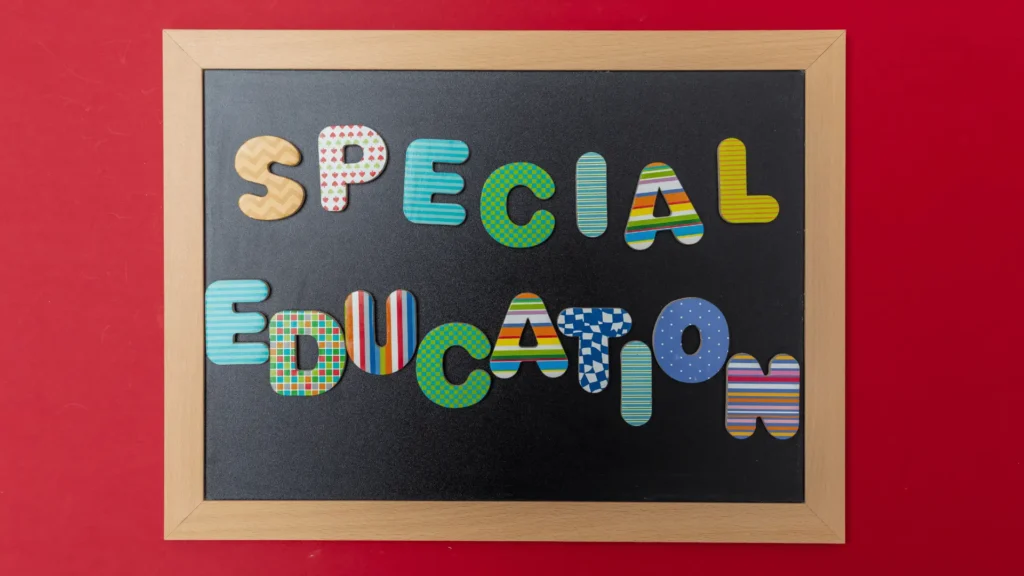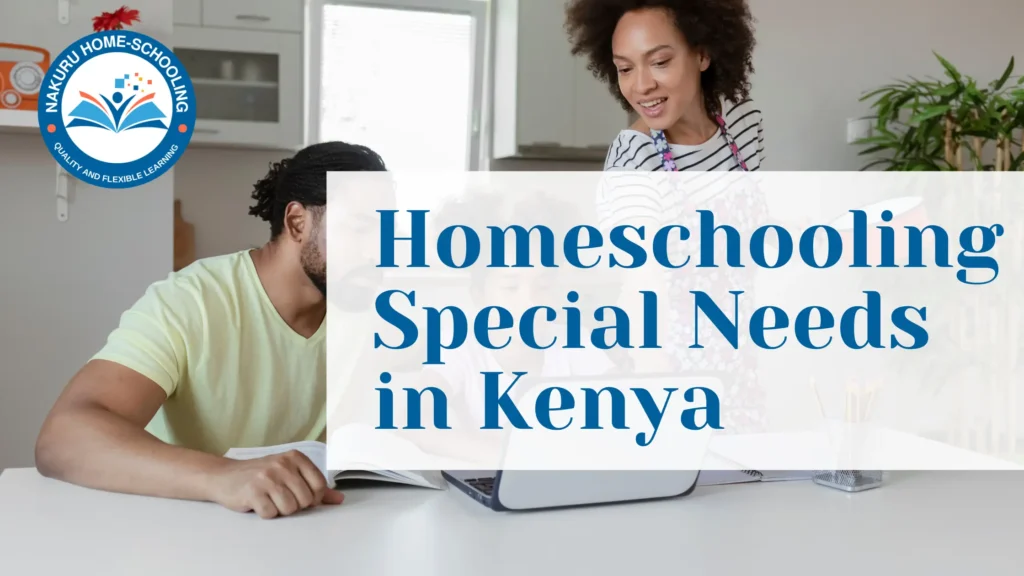Homeschooling Special Needs in Kenya: Giving Every Child a Chance to Thrive
Raising and educating a child with special needs in Kenya presents unique challenges. Many parents struggle to find schools that offer personalized attention, inclusive learning environments, or the right support systems for their children. Classrooms are often overcrowded, teachers overstretched, and specialized resources limited. For families of children with autism, ADHD, dyslexia, or other learning and developmental differences, the journey can feel overwhelming and isolating.
This is where homeschooling special needs in Kenya becomes a life-changing alternative. Homeschooling enables parents to create a flexible, customized learning plan that aligns with their child’s pace, abilities, and personality. It ensures that education is not just about passing exams but about nurturing confidence, independence, and long-term success.
At Nakuru Homeschooling, we understand the unique needs of children who learn differently. Our team designs tailored homeschooling programs, resources, and support systems to help parents provide quality education at home. With the right guidance, tools, and community, homeschooling special needs children in Kenya is not only possible — it’s powerful.
Special Education and Homeschooling in Kenya
In Kenya, the conversation around special education has grown over the past decade, but many families of children with disabilities still face significant challenges. According to the Ministry of Education, thousands of learners require special education support, yet public schools remain overcrowded and under-resourced. Specialized teachers are few, therapy services are costly, and inclusive classrooms are still more of an aspiration than a reality.
Parents of children with autism, ADHD, dyslexia, Down syndrome, or physical disabilities often find themselves at a crossroads. They want the best for their children but struggle with schools that cannot fully cater to their unique needs. This gap has left many families searching for alternatives — and one of the fastest-growing solutions is homeschooling learners with disabilities in Kenya.
Is Homeschooling Legal in Kenya?

The Kenyan Constitution recognizes the right of every child to education. While the Basic Education Act emphasizes formal schooling, it also allows for alternative approaches as long as children are not denied access to learning. This has opened a space for homeschooling families, including those raising children with special needs, to structure education that works best for them.
In fact, a growing number of Kenyan parents are choosing inclusive homeschooling because it provides flexibility and individualized learning that mainstream schools cannot. With the right curriculum, guidance, and community support, homeschooling is proving to be not just a stop-gap, but a strong educational pathway for special needs learners.
Why the Shift Toward Homeschooling?
- Personalized Attention: Parents can adapt teaching to their child’s pace and abilities.
- Reduced Pressure: Children are not forced into rigid systems that often cause frustration and low self-esteem.
- Flexibility: Families can integrate therapies, routines, and life skills into the learning process.
- Holistic Development: Homeschooling allows focus on both academics and the child’s emotional, social, and practical growth.
As awareness spreads, homeschooling in Kenya for special needs children is becoming less of an exception and more of a practical choice for families who want meaningful progress instead of just meeting minimum requirements.
Why Homeschooling is a Better Option for Special Needs Learners

For many Kenyan families raising children with special needs, traditional schools can feel like a constant uphill battle. Large class sizes, limited teacher training, and rigid curricula often make it difficult for learners with unique needs to thrive. This is why more parents are turning to homeschooling as a better option for special needs learners in Kenya.
1. Personalized Learning at Your Child’s Pace
Every child learns differently. In homeschooling, parents and tutors can adjust the curriculum to match the learner’s strengths, challenges, and interests. A child with dyslexia, for example, can receive more time and alternative reading strategies without the pressure of keeping up with 40 classmates.
2. Flexibility in Teaching Methods
Unlike mainstream schools that rely heavily on one-size-fits-all instruction, homeschooling allows families to use inclusive teaching methods — such as multi-sensory learning, visual aids, or hands-on activities — that best suit their child’s style of learning.
3. Reduced Stress and Anxiety
Many special needs children face bullying, overstimulation, or anxiety in crowded school environments. Homeschooling provides a safe, familiar space where the learner feels understood and supported, boosting both confidence and self-esteem.
4. Integration of Therapies and Life Skills
With homeschooling, parents can integrate speech therapy, occupational therapy, or life skills training directly into the daily schedule. This creates a holistic approach that focuses not only on academics but also on the child’s overall development.
5. Stronger Parent–Child Bond
Spending more time together allows parents to better understand their child’s unique personality, strengths, and triggers. This bond often translates into better communication, emotional growth, and trust.
6. Proven Results in the Kenyan Context
Recent studies in Kenya have shown that homeschooled children often perform better in English and mathematics compared to their peers in conventional schools. For learners with special needs, this individualized approach translates into real progress that is often missing in formal classrooms.
Challenges & Considerations for Homeschooling Special Needs in Kenya

While homeschooling offers unmatched flexibility and personalization, it also comes with its own set of challenges. Parents need to be aware of these realities toHomeschooling in Kenya: 10 Powerful Reasons to Consider It prepare well — and to seek the right support.
1. Limited Access to Resources and Materials
Specialized learning materials, assistive technologies, and therapy tools are not always easily available in Kenya. Many parents struggle to find affordable resources tailored to children with autism, ADHD, dyslexia, or physical disabilities.
2. Parental Training and Capacity
Not every parent has a background in education, let alone special education. Homeschooling requires understanding how to adapt curriculum, manage behavior, and track progress — which can feel overwhelming without guidance.
3. Socialization Concerns
One of the biggest fears parents express is whether their child will miss out on friendships, teamwork, and social development. Without intentional planning, homeschooled learners may have fewer opportunities to interact with peers.
4. Balancing Academics and Therapy Needs
Children with special needs often require multiple therapies (speech, occupational, behavioral). Coordinating these alongside academics can be time-consuming and stressful for families without a structured plan.
5. Financial Implications
While homeschooling can save on certain school-related costs, it may require investment in tutors, learning aids, or therapy sessions. Some parents also face income adjustments if one parent reduces working hours to focus on homeschooling.
6. Legal and Policy Uncertainty
Although homeschooling is not illegal in Kenya, the law does not yet provide clear regulations, especially for learners with disabilities. Parents may feel uncertain about exams, curriculum approvals, and long-term certification.
7. Emotional Burnout for Parents
Caring for a special needs child is already demanding. Taking on the role of teacher, therapist, and caregiver without adequate support can lead to exhaustion or feelings of isolation.
These challenges are very real, but they are not barriers. With proper systems, expert support, and community, families can overcome them and see their children thrive.
How Nakuru Homeschooling Supports Special Needs Learners

At Nakuru Homeschooling, we believe every child deserves an education tailored to their unique abilities. We know the challenges parents face — limited resources, lack of guidance, and the fear of not doing enough for their child. That’s why we’ve designed a homeschooling model that specifically supports families raising children with special needs in Kenya.
1. Customized Learning Plans (IEPs)
We start by assessing each child’s strengths, challenges, and interests. Based on this, we create an Individualized Education Plan (IEP) that sets realistic goals and a clear path forward. This ensures that learning is not only academic but also practical, emotional, and social.
2. Inclusive Curriculum and Resources
Our curriculum blends the Kenyan Competency-Based Curriculum (CBC) with flexible, special needs–friendly approaches. We integrate multi-sensory learning techniques, life skills, and assistive tools to ensure that children can learn in ways that work for them.
3. Parent Training and Coaching
We walk with parents step by step, providing training on how to teach, manage routines, and track progress at home. We also offer ongoing coaching sessions to answer questions and provide strategies that reduce stress and boost confidence.
4. Access to Expert Tutors and Therapists
Through our network, families can access trained special education tutors, as well as referrals to therapists and specialists when needed. This ensures homeschooling goes hand in hand with professional support.
5. Community and Social Interaction
We organize group activities, field trips, and peer interactions so learners do not miss out on socialization. This also gives parents a supportive community of like-minded families.
6. Guidance on Exams and Certification
We help parents navigate legal considerations, curriculum approvals, and exam registration for learners who want to transition to formal exams like KCPE, IGCSE, or other pathways.
7. Emotional and Practical Support
Above all, we encourage. Homeschooling a child with special needs can feel overwhelming, but with Nakuru Homeschooling, parents never walk the journey alone. We are here to ensure both the learner and the family thrive.
In short: Where parents see obstacles, Nakuru Homeschooling provides solutions. We exist to make homeschooling not just possible, but powerful, for every child with special needs in Kenya.
Step-by-Step Guide: Setting Up a Special-Needs Friendly Homeschool in Kenya

Starting a homeschool journey with a special needs learner may feel overwhelming at first, but with the right structure, it becomes manageable and rewarding. Below is a simple step-by-step guide that parents in Kenya can follow to set up a supportive homeschooling environment.
1. Get a Professional Assessment
Before choosing a curriculum or teaching style, it’s important to understand your child’s specific needs. An educational or psychological assessment will identify learning strengths, challenges, and areas that require therapy or extra support.
At Nakuru Homeschooling, we help families connect with qualified professionals who provide clear, practical recommendations.
2. Choose or Adapt the Curriculum
Not all curricula fit every child. You may choose from:
- Kenyan CBC (Competency-Based Curriculum)
- International options like IGCSE or IB
- Tailored “Legacy Curriculum” for skills and life readiness
For special needs learners, the curriculum should be adapted with flexibility in pace, teaching methods, and assessment styles.
3. Create an Individualized Education Plan (IEP)
An IEP outlines learning goals, strategies, and progress tracking. This ensures that the child’s education focuses on both academics and personal development, including communication, social, and life skills.
4. Prepare the Learning Environment
Set aside a calm, structured space at home with minimal distractions. Include visual aids, learning tools, and where possible, assistive technology (such as speech apps, audiobooks, or adaptive writing tools).
5. Plan a Balanced Daily Schedule
Children with special needs thrive in predictable routines. A balanced homeschool day should include:
- Short, focused learning sessions
- Breaks for relaxation and play
- Therapy time (speech, occupational, behavioral, as needed)
- Practical life skills (cooking, self-care, social tasks)
6. Monitor Progress Regularly
Track your child’s growth using checklists, journals, or digital apps. Celebrate small wins — every step forward counts. If something isn’t working, adapt quickly without guilt.
7. Incorporate Socialization Opportunities
Arrange playdates, field trips, or group learning with other homeschooling families. This helps children build friendships and learn teamwork in safe, inclusive settings.
8. Stay Connected with Experts and Support Networks
No parent should walk this journey alone. Joining communities, seeking mentorship, and working with professional tutors or therapists provides strength and fresh ideas.
Nakuru Homeschooling supports families through each of these steps — from assessment and IEP creation to curriculum adaptation, parent coaching, and ongoing mentorship.
Practical Tips & Resources for Homeschooling Special Needs in Kenya
Homeschooling special needs in Kenya doesn’t have to be a lonely or overwhelming journey. With the right tools and connections, parents can create a rich, supportive learning environment at home. Below are some practical tips and resources to help you succeed.
1. Use Assistive Learning Tools
- Speech-to-text apps (like Google Speech Recognition) for children with dyslexia or writing difficulties.
- Audiobooks & podcasts for learners who process information better through listening.
- Visual schedules and picture cards for children with autism to provide structure and predictability.
- Simple adaptive equipment (like pencil grips, slant boards, or large-print books) to ease daily learning tasks.
2. Tap Into Local Support Services
Kenya has growing networks that support learners with disabilities. Parents can connect with:
- Kenya Institute of Special Education (KISE) – training and resource center.
- NGOs such as Action Network for the Disabled (ANDY) and Kenya Society for the Blind.
- Local therapy centers in Nakuru, Nairobi, and other towns for speech, occupational, and physical therapy.
At Nakuru Homeschooling, we maintain a directory of trusted professionals and link families to the right experts when needed.
3. Leverage Online Resources
- Websites with free printable worksheets tailored for special needs learners.
- Platforms like Khan Academy Kids (for basic skills practice) and Starfall (for literacy support).
- Communities and forums where parents share homeschooling experiences and tips.
4. Build a Parent Support Network
Homeschooling special needs children is easier with community. Consider joining:
- Parent WhatsApp or Facebook groups on special education in Kenya.
- Local homeschooling meetups or playgroups.
- Church or community-based support initiatives.
5. Prioritize Self-Care for Parents
Your child’s progress depends on your well-being. Take breaks, ask for help, and remember: seeking professional support is a sign of strength, not weakness.
Tip from Nakuru Homeschooling: We help families cut through the overwhelm by recommending the right tools and resources based on each child’s specific needs. Instead of spending months researching, you can start strong with a guided plan.
Conclusion: Every Child Deserves a Learning Path That Works
Homeschooling special needs children in Kenya is not without its challenges — from limited resources to socialization concerns. Yet, as we’ve seen, it also offers unmatched opportunities: flexibility, personalized learning, and the chance to nurture a child’s strengths at their own pace. For many families, it has become the most effective way to ensure their child receives quality education and thrives both academically and emotionally.
At Nakuru Homeschooling, we are committed to walking this journey with you. We provide tailored learning plans, inclusive resources, expert guidance, and a supportive community so that no parent has to feel alone or unprepared. With the right tools and mentorship, homeschooling your child with special needs is not just possible — it can be life-changing.
Your child deserves more than survival in a system that doesn’t fit — they deserve to flourish.
Ready to begin? Contact Nakuru Homeschooling today for a free consultation and discover how we can design a homeschooling plan that works for your child’s unique needs.
